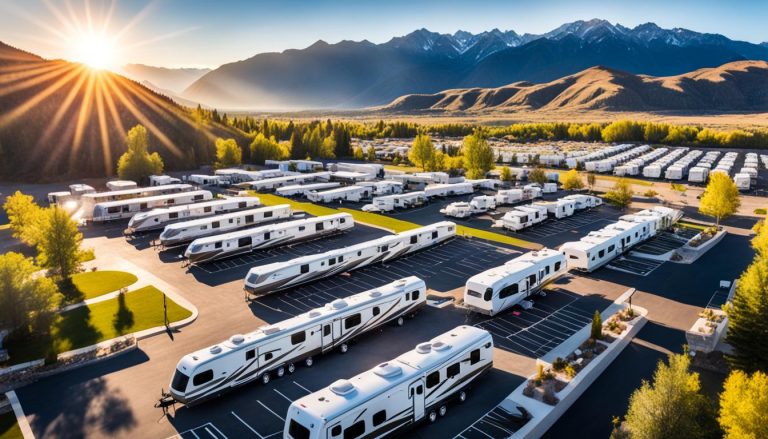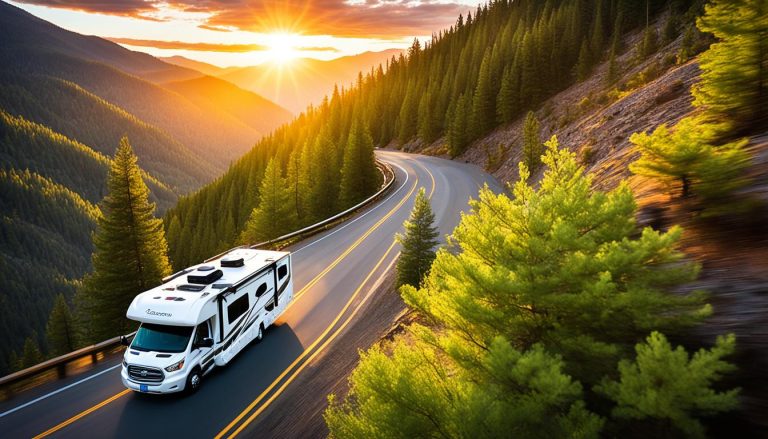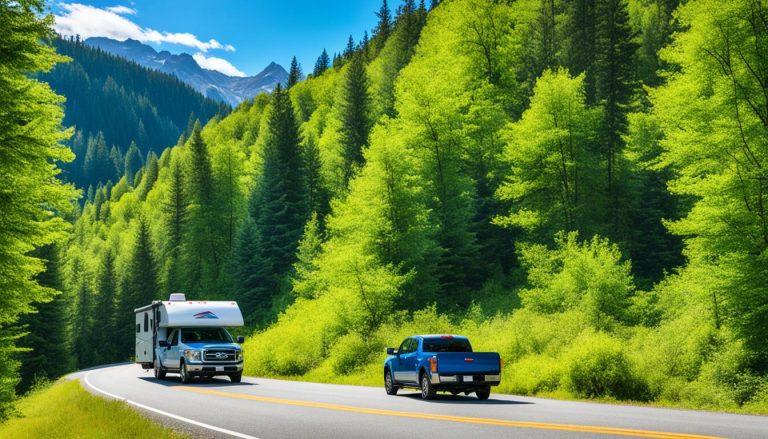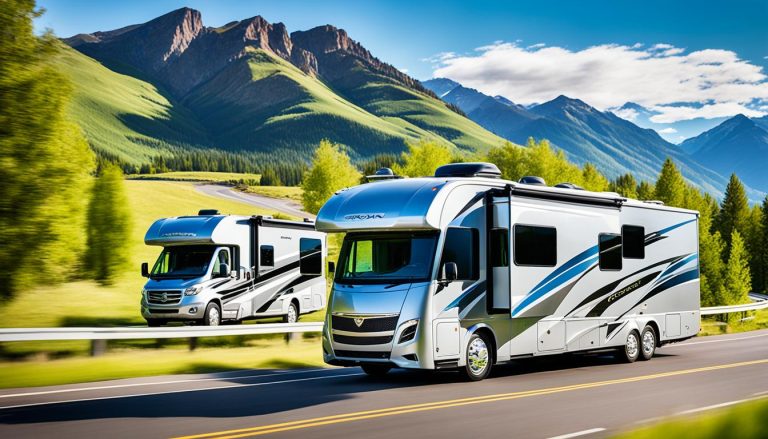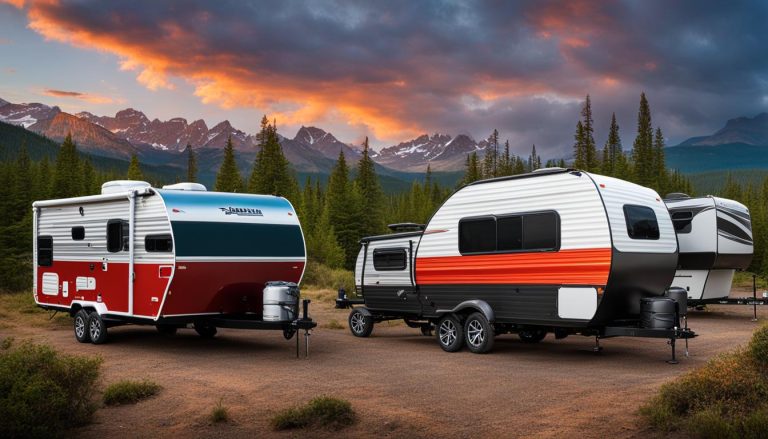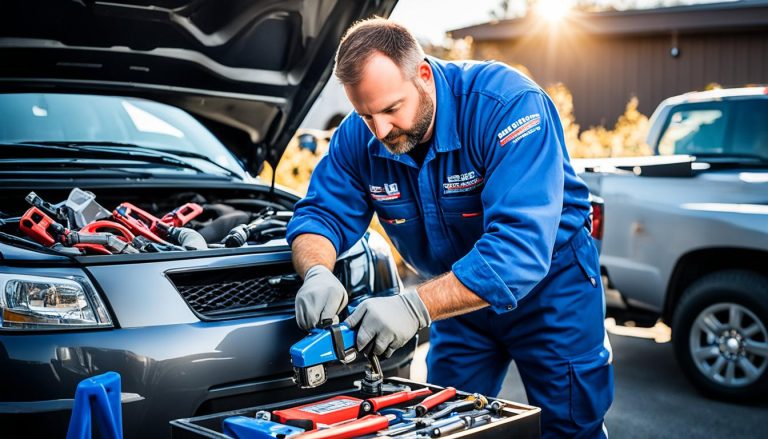Best Solar Power Options for Towable RVs
gorvlifestyle.com and its partners may earn a commission if you purchase a product through one of our links
As Americans continue to embrace the freedom of the open road, the trend of sustainable travel surges, making solar power options for Towable RVs an increasingly popular and pragmatic choice. Whether it’s for the cross-country traveler seeking self-sufficiency or the weekend warrior aiming to reduce their carbon footprint, RV solar panels and energy systems have evolved to meet a variety of needs. The power to live, work, and explore unfettered by conventional energy sources offers an unprecedented level of freedom, especially with advancements in solar charger for RV units and portable solar panels for RV enthusiasts. The attraction of off-grid RV solar capabilities allows one to venture beyond the campsites, powered by the sun’s endless energy.
Whether the goal is cost-effectiveness, simplicity, or sheer nomadic versatility, there’s a solar solution to match. Solar power kits for RV owners provide comprehensive options, ranging from basic setups to more complex systems. Meanwhile, those in search of the best solar panels for camping will find a variety of choices that strike the right balance between efficiency and ease of use. To ensure a successful transition to solar, proper solar panel installation for RV rigs is integral, alongside selecting affordable RV solar panels that don’t compromise on quality.
Key Takeaways
- Identifying suitable solar power options for Towable RVs is essential for self-sufficient travel.
- RV solar panels offer the liberation to explore remote locations away from power grids.
- The flexibility of portable solar panels for RV usage caters to varying energy needs and environments.
- Off-grid RV solar systems support a sustainable lifestyle and a lower ecological impact while on the road.
- Solar power kits for RV adventurers can be a cost-effective investment towards long-term savings.
- Careful consideration of your energy requirements will ensure the selection of the best solar panels for camping experiences.
- Professional advice may benefit those navigating the complexities of solar panel installation for RV units.
The Advantages of Switching to Solar in Your Towable RV
Embarking on the sustainable RV living journey with solar power for Towable RVs has become increasingly popular among adventurers seeking autonomy and conservation. The transition to a solar-powered lifestyle is not just about embracing renewable energy; it offers tangible perks, including significant RV solar power savings, environmental benefits, and the enhancement of off-grid capabilities that many travel enthusiasts desire.
Cost Savings and Sustainability
One of the most compelling reasons to adopt solar power is the potential for cost savings over the lifespan of your RV. Solar installations may come with an upfront cost, but the reduction in traditional energy expenditure means that these systems can pay for themselves over time. In addition, the integration of solar technology resonates with the values of sustainable RV living, as it reduces the carbon footprint associated with fossil fuel-based power generation. The journey toward a greener lifestyle on wheels has a rewarding financial side, evidenced by long-term savings and reduced environmental impact.
Enhancing Off-Grid Capabilities for Adventure Seekers
Equipping your Towable RV with solar power not only ensures energy self-reliance but also expands your horizons to go beyond conventional campgrounds. The ability to generate your own electricity means you can power your journey into the heart of nature, accessing remote and peaceful locales. The experiences of RV veterans like Shari Galiardi and Dave Hutchison, who thrive in off-grid environments, elucidate the robustness of solar systems in the most secluded retreats. With off-grid RV solar options available today, explorers can enjoy uninterrupted adventures far from the beaten path.
Long-Term Energy Independence
Choosing solar power is a decisive step toward long-term energy independence. Your Towable RV can become a beacon of freedom as you cruise through different landscapes without worrying about the next electrical hookup. Aligning with the ethos of sustainable nomadic living, solar-empowered RV owners like Galiardi and Hutchison lead the way in showcasing how to achieve a self-sufficient and eco-friendly lifestyle. Moreover, this independence is often paired with financial incentives, like the federal tax credits for solar installations, making solar power an even more attractive option for those with a fervor for exploration and sustainability.
| Year | Cumulative Savings | Environmental Impact |
|---|---|---|
| 1 | $500 | 1 ton of CO2 avoided |
| 5 | $2,500 | 5 tons of CO2 avoided |
| 10 | $5,000 | 10 tons of CO2 avoided |
Understanding RV Solar Panel Systems
Embarking on RV adventures gives one the freedom to explore, but it also brings the necessity of sustainable and reliable energy sources. Solar panels have become an integral power solution for campers everywhere. Whether you’re parked in a serene forest or traveling across the country, a properly configured RV solar panel system provides the autonomy to live comfortably off-grid.
Types of Solar Panels: Monocrystalline, Polycrystalline, and Amorphous
When selecting solar panels for your RV, understanding the differences between monocrystalline, polycrystalline, and amorphous options is crucial. Monocrystalline solar panels for RV are known for their high efficiency and sleek design, making them a popular choice for those who prioritize performance and space-saving capabilities. On the other hand, polycrystalline RV solar panels serve as a durable and cost-effective alternative, although they may require more roof space due to their slightly lower efficiency rates. For a flexible and lightweight solution, amorphous solar panels for campers offer adaptability to various surfaces, which is especially beneficial on the curved roofs of many RVs.
Key Components: Inverters, Charge Controllers, and Solar Batteries
Critical to an RV solar power system are the components like the RV solar inverter, the RV charge controller, and the RV solar batteries. The solar inverter’s role is to convert the direct current (DC) produced by the solar panels into an alternating current (AC), which is usable within the RV. Meanwhile, the charge controller is essential in managing the power flow to the batteries, ensuring that they are charged optimally without being overcharged, which could reduce their lifespan.
A robust solar battery system is key, as it stores the converted energy for use when sunlight is sparse. The industry is witnessing continual advancements in this space, with some solar batteries now featuring self-heating capabilities, ideal for use in colder climates and improving overall efficiency and battery longevity.
To fully harness the solar power potential for your RV, a thoughtful selection and configuration of these components ensure seamless operation as you embrace the freedom of the open road.
Solar Power Options for Towable RVs
For those invested in the towable RV lifestyle, the quest for the most efficient and suitable solar power options can be as varied as the destinations they trek to. Whether it’s a journey through the national parks or a season spent by tranquil lakesides, the right solar solution ensures self-sufficiency and comfort on the go.
One popular choice among travel enthusiasts is the portable solar panels for RV. These panels offer ease of installation and the flexibility to capture sunlight at optimum angles, a particularly beneficial option for travelers like Galiardi and Hutchison, who enjoy temporary stays off-grid. For these occasional adventurers, a solar charger for RV provides the necessary power without the commitment to a full solar system installation.
Meanwhile, the best solar panels for camping might not be one-size-fits-all but rather dependent on specific needs such as power output and durability. Those who spend considerable time off the grid or live full-time in their RVs may lean towards more robust RV solar system installations. These can include high-output panels capable of running high-draw appliances and supporting a sustained, eco-friendly lifestyle.
Let’s look at a detailed breakdown of solar power options to cater to different needs within the RV community:
| Type of Solar Panel | Best For | Benefits |
|---|---|---|
| Monocrystalline | Full-time RVers | High efficiency, Longevity |
| Polycrystalline | Seasonal/off-grid adventures | Cost-effective, Durable |
| Amorphous | Flexible applications | Lightweight, Adaptable to contours |
| Portable | Casual campers | Mobility, Easy setup |
For individuals prioritizing mobility and ease of use, portable solar panels serve as a prime choice, allowing them to harness the sun’s power whether stationed or on the move. This underscores the versatility and adaptability necessary for the ever-changing landscapes and sun exposure conditions inherent to RV travel.
Regardless of the selected type, integrating solar power into the RV experience not only contributes to environmental conservation but also offers the traveller an unrivalled sense of freedom and autonomy. Careful assessment of individual travel habits and power needs will guide RV owners towards the solar solution that best fits their nomadic lifestyle.
Installation Insights: Setting Up Your Solar Panels
Embarking on a DIY RV solar setup can be an empowering experience, or perhaps opting for RV solar power kit installation with professional guidance more befits your level of expertise. The crux lies in tailoring the solar solution to your trusty recreational vehicle and your unique travel desires. Let’s illuminate the key steps to a successful solar panel installation for RV enthusiasts.
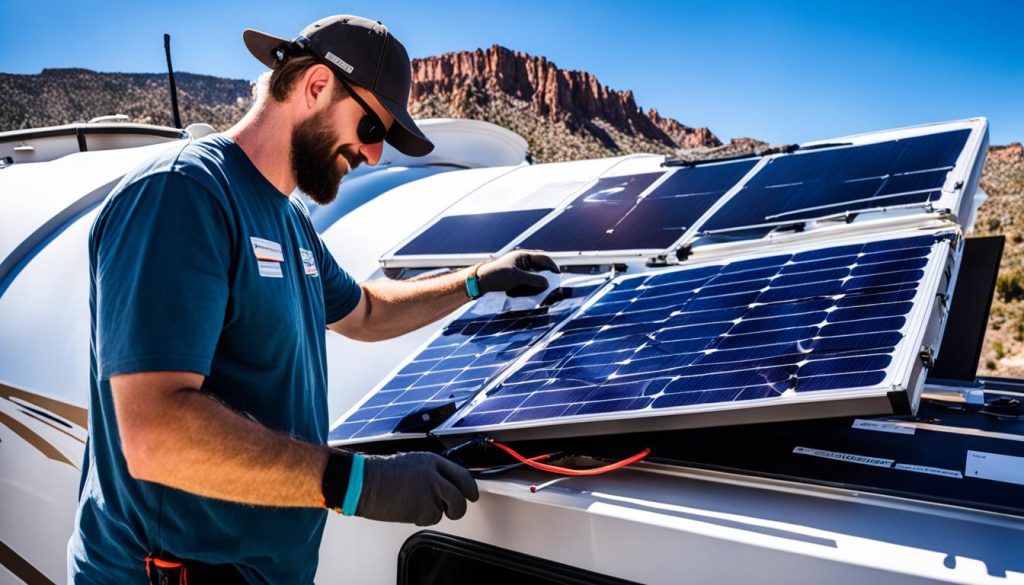
- Determine energy requirements based on your lifestyle
- Select the optimal solar panel type that reflects your RV’s constraints and your energy goals
- Acquire the essential components, including charge controllers, inverters, and sturdy solar batteries
- Plan the layout of your panels on the RV, considering the balance between exposure to sunlight and aerodynamic design
Indeed, the march from a basic solar arrangement to an intricate onboard power plant can be complex. Regardless, whether one tackles it alone or with professional aid, the destination is a tailored, ineffable sense of freedom and autonomy on the open road.
Many adventurers find that a successful installation is a rewarding process that leads to an enhanced understanding of their energy consumption and a greater appreciation of sustainable living.
Let’s flesh out some pivotal areas for consideration:
| DIY Installation | Professional Installation |
|---|---|
| Cost-effective approach | Higher initial investment |
| Hands-on learning experience | Expertise ensures optimal system performance |
| Potential for trial-and-error learning | System reliability from practiced installers |
| Customization at each step | Stress-free setup with professional guidance |
Whether you tread the path of a DIY enthusiast or seek the knowledge of seasoned professionals, each solar expedition demands thorough planning and a fine-tuned approach. Ruminating on these insights can light the way to a successful installation, ensuring endless journeys under the sun-kissed sky.
Assessing Your Solar Needs: How Much Power Do You Really Need?
Embarking on an RV adventure means planning for your energy needs to ensure you have the power necessary for a comfortable and sustainable journey. An integral component of preparing for life on the road is determining the size of the RV solar system required to meet your RV solar panels power needs. To accurately calculate your RV energy consumption and the corresponding system size, a thorough understanding of your consumption habits is crucial.
Calculating Power Consumption for an RV Lifestyle
The first step in assessing your solar requirements is to calculate your daily power usage. This involves a detailed look at the appliances and devices you’ll be using and how often they’ll be operational. From air conditioning systems and refrigerators to charging laptops and phones, each item contributes to your overall energy consumption. Estimating your energy usage comes down to identifying these power needs and adding them up to get a baseline from which you can work.
Using Energy Consumption Habits to Determine Solar System Size
Once you’ve established an estimate of your typical power usage, it’s time to consider how to translate that into the solar system size. This includes not only the average number of hours of sunlight you can expect but also the energy efficiency of your chosen RV solar panels. Considering the variation of potential sunlight exposure as you travel is essential for creating a robust system. Let’s break down the process into a comprehensive table that outlines the categories you must consider when determining your RV solar system size.
| Appliance | Wattage (Watts) | Hours per day | Total Consumption (Watt-hours) |
|---|---|---|---|
| Refrigerator | 150 | 24 | 3600 |
| Lights | 10 | 5 | 50 |
| TV | 100 | 4 | 400 |
| Air Conditioner | 1500 | 3 | 4500 |
| Laptop | 50 | 8 | 400 |
| Total Daily Consumption | 8950 Watt-hours |
With the total daily consumption estimated, RV owners can start planning the size of the solar system required. The key is to match your energy usage with the production capability of your solar panels, ensuring that you have sufficient power throughout your travels, regardless of external power sources. Remember, an energy-efficient lifestyle paired with an effectively sized solar system can significantly contribute to successful off-grid RV living.
Latest Innovations: Flexible and Portable Solar Panels for RVs
The realm of solar power has witnessed a significant surge in innovation, which prominently features the advancement of portable solar panels for RV and flexible RV solar panels. These cutting-edge products embody the ongoing quest for innovative solar power for camping, offering a suite of benefits designed to cater to the modern nomad.
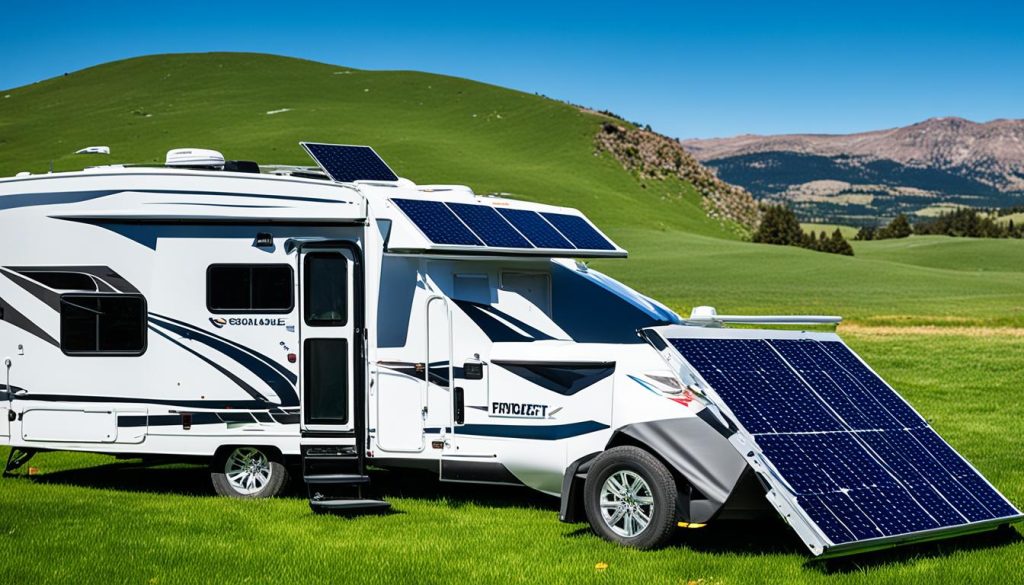
RV enthusiasts are now presented with solar solutions that boast the allure of easy installation – a nod to those who value their time soaking in nature over complex setup procedures. More than just installation convenience, these panels are renowned for their adaptability, seamlessly conforming to the contours of various RV rooftops, thus maximizing aerodynamic potential.
The construction of these flexible solar panels is not just about pleasing aesthetics; it’s a convergence of functionality and science. By adopting a lightweight design, these panels mitigate overall vehicle stress, helping to prolong the lifespan of the RV they grace. Yet, it’s the portable aspect that truly diversifies their application – enabling users to position their source of energy wherever the sun is most generous throughout the day.
- Versatility in positioning to optimize sun exposure
- Enhanced aerodynamics with flexible panel design
- Reduced vehicle stress through lightweight construction
- Stepping stone to greater energy autonomy while camping
It is apparent that these modern solutions have significantly diminished the dependence on traditional power grids, empowering RV travelers with the ability to harvest energy as freely as they explore. This has dramatically enriched the appeal of pursuing a lifestyle that seeks the serenity of nature without forsaking the comforts of modern energy demands.
In conclusion, the advent of flexible and portable solar panels marks a pivotal shift towards self-sufficiency for RV aficionados, matching the spirit of adventure with the assurance of energy autonomy.
Solar Panel Installation for RV: Do-It-Yourself vs. Professional Services
Embarking on an RV adventure affords a sense of freedom and autonomy, and integrating a solar setup can enhance this independence further. Many RV owners today grapple with the decision of whether to attempt a DIY solar panel installation for their RV or to opt for professional RV solar panel services. Each path has its merits and challenges, which merit careful consideration to ensure the long-term success of your RV solar setup.
The Pros and Cons of DIY Installation
For the hands-on enthusiast, the allure of installing solar panels oneself is strong. The benefits of the DIY route are multi-fold; it potentially reduces costs significantly and can instill a deep understanding of the system’s inner workings. However, the risks include the possibility of incorrect installation, which can jeopardize both the system’s efficiency and the vehicle’s integrity.
- Cost-Effective: Reduces labor expenses significantly.
- Educational Value: Provides a deep understanding of solar systems.
- Personal Achievement: Delivers a sense of accomplishment upon successful completion.
- Technical complexities that surpass the average person’s skillset.
- Potential for inadvertently voiding warranties on equipment.
- Requirement for specialized tools.
When to Consider Professional Solar Panel Installation
On the flip side, professional solar panel installation serves as an investment in expert knowledge and workmanship. Professionals ensure your system is optimized for maximum energy absorption and properly connected, adhering to safety standards. While this option represents a higher upfront cost, it can save you considerable time and provide peace of mind regarding the structural and electrical integrity of your RV.
- Expertise: Trained professionals with experience in complex systems.
- Efficiency: Installation is typically quicker, with optimization for maximum output.
- Risk Mitigation: Professionals understand how to manage risks associated with installation.
Considering the potential challenges and the scale of your intended RV solar setup, it may be wise to opt for professional installation if:
- You are not confident in your technical abilities.
- The system’s scale and complexity are high.
- Your rig requires structural modifications for panel mounting.
Ultimately, whether you choose the DIY route or procure professional services depends on a variety of factors, including your comfort with technical tasks, your budget, and the scale of the solar installation. Ensuring your RV is equipped with a reliable power source will not only contribute to the sustainability of your travels but also enhance your overall experience on the open road.
Solar Power Kits for RV: A Buyer’s Guide
Embarking on the road with an RV offers an exhilarating sense of freedom, but maintaining that autonomy requires a reliable power source. That’s where RV solar power kits step in, equipping your rolling home with its very own renewable energy plant. When selecting the best solar panels for camping, potential buyers must take into account not only their energy needs but also the kind of adventures they pursue.
Considering the remarkable potential of solar chargers for RV to enable extended off-grid stays, it’s increasingly common for nomads to turn to the sun for their electricity needs. Whether you seek a compact option for occasional use or a robust system fit for a full-time living, there’s a breadth of choices on the market. Affordability is often a concern, but rest assured that there are affordable RV solar panels that don’t skimp on quality or efficiency.
Finding the right solar setup can be overwhelming, but worry not — we’ve compiled a comprehensive table breaking down several popular choices to suit diverse lifestyles and budgets.
| Kit Size | Best Use | Included Components | Pros | Cons | Estimated Price Range |
|---|---|---|---|---|---|
| 100W Portable Kit | Weekend outings, light use | Solar panel, charge controller, cables, carry case | Easy to use, mobile | Limited power for appliances | $150 – $300 |
| 200W Rooftop Kit | Short-term travel, moderate use | 2 solar panels, inverter, mounting hardware | More power, semi-permanent | Installation required | $400 – $750 |
| 400W High-Efficiency Kit | Extended stays, frequent use | Premium solar panels, inverter, charge controller, battery | Supports multiple devices, high-output | Higher initial investment | $800 – $1,500 |
Remember, when factoring in your preferences, consider whether a kit complements your typical travel areas — sunny states might require less wattage, whereas cloudier regions might demand more. Overarching all is the principle of sustainability, ensuring that the heart of the RV — its power system — is in harmony with nature’s offerings.
Ultimately, whether you opt for a minimalist setup or a full-fledged solar array, the joy of independence on the open road is magnified by the right power kit. Take your time, research thoroughly, and choose a solar option that fits your RV lifestyle like a glove.
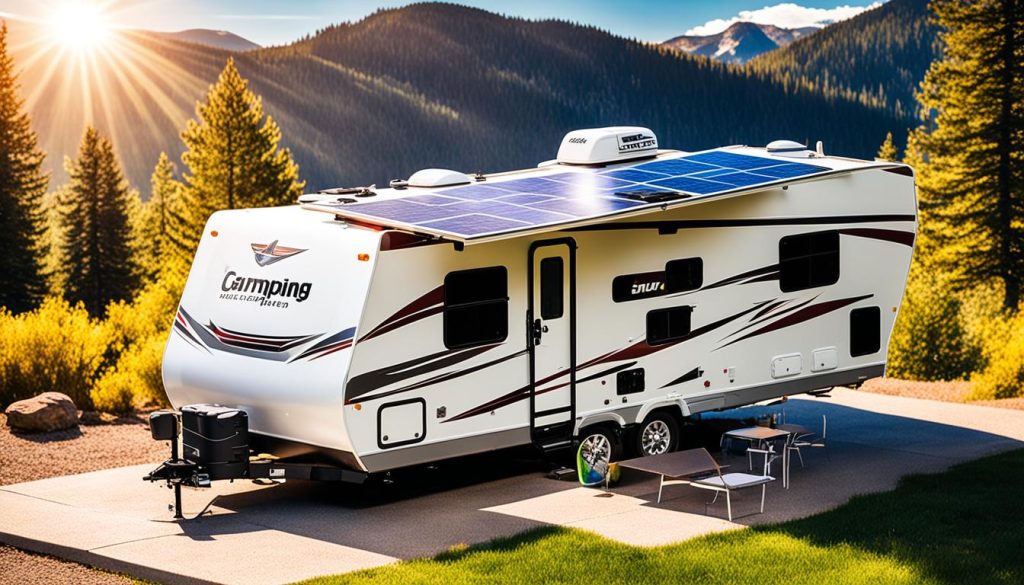
Off-Grid RV Solar: Maximizing Your Energy Use
Embracing the off-grid RV solar lifestyle requires savvy management of your energy resources to fully enjoy the freedom and independence it offers. Boondocking with solar power has become a game-changer for adventurers, allowing them to sustain their travels without the need for traditional hookups. With the right energy efficiency strategies and a system designed for adaptability, travelers can boondock in remote locations with ease.
Strategies for Energy Efficiency While Boondocking
Energy conservation in an off-grid RV begins with conscious usage and smart planning. One of the first steps is to employ energy-efficient appliances that draw less power. LED lighting, energy-saving refrigerators, and efficient water heaters greatly reduce your daily consumption. Additionally, monitoring and managing your energy usage through a solar-powered charge controller ensures that your system is not overtaxed.
Maximizing natural light during the day, minimizing heat buildup with reflective window coverings, and carrying out energy-intensive tasks during peak sunlight hours are all practical ways to enhance efficiency. Here’s a guide to help manage energy needs while boondocking:
- Use LED bulbs for all lighting needs
- Install efficient insulation to maintain internal temperatures
- Upgrade to energy-efficient appliances
- Regularly maintain and clean solar panels for optimal performance
Adapting to Varying Sunlight Conditions During Travel
Since sunlight availability can change based on location and weather conditions, adapting your RV solar system is crucial for maintaining a steady energy supply. This can involve augmenting your solar setup with a generator or exploring dual charging systems that allow for alternator charging while driving. Positioning your RV to maximize solar panel sun exposure throughout the day will also enhance your solar intake, guaranteeing that you capture as much solar energy as possible, wherever you may find yourself.
| Strategy | Description | Benefit |
|---|---|---|
| Panel Tilting | Adjusting the angle of your solar panels to face the sun directly. | Increases energy absorption, especially during winter months. |
| Dual Charging Systems | Combining solar charging with your vehicle’s alternator. | Provides additional charging when driving to your next destination. |
| Energy Management Systems | Using devices to track and regulate power usage. | Prevents energy waste and prolongs battery life. |
| Supplementary Generators | Portable generators serve as backup power sources. | Ensures a steady power supply during extended periods of overcast weather. |
Living the dream of mobile, off-grid freedom is within reach by adopting smart off-grid RV solar configurations and behavioral changes. By integrating these methods into your travel routine, you can extend your boondocking duration and reduce the anxiety of running low on power.
Maintenance and Longevity of Your RV Solar Panels
Ensuring that your RV’s solar panels continue to provide reliable energy for years comes down to regular maintenance and understanding the elements they are exposed to. RV solar panel maintenance is not only about cleanliness but also includes weatherproofing RV solar systems and spotting early signs of wear.
Routine Checkups and Cleaning
To maintain long-lasting solar panels for your RV, consistent checkups and cleaning play a pivotal role. Solar panels exposed to the elements can accumulate dust and debris, which can hinder their efficiency. A simple cleaning schedule, using non-abrasive materials and mild soaps, can prevent the build-up of substances that might obstruct sunlight.
- Visual Inspection: Regularly examine for any physical damage to the panels, such as cracks or erosion, which could indicate it’s time for repairs or replacements.
- Connection Check: Ensure that all wiring and connections are secure, as loose connections can lead to a host of electrical issues.
- Performance Monitoring: Keep an eye on the energy output to spot any discrepancies that might be due to dirty or shaded panels.
Dealing with Weather and Wear
Travel introduces RV solar systems to a variety of weather conditions, from pounding rain to intense heat. Weatherproofing RV solar systems is critical to protect from such wear and tear. It involves sealing any installation gaps and using protective coatings that are designed to extend the life of solar panels against harsh environmental conditions.
- Use UV-resistant sealants to prevent weathering effects on wiring and metal parts.
- Invest in hail-resistant solar panel covers for protection against falling debris and stormy weather.
- Consider tilt mounts to easily adjust the panel angle, optimizing sun exposure and shedding snow or debris.
With vigilant care and upkeep, your RV’s solar panels can provide sustainable energy to power your adventures for many years. Being proactive about maintenance is key to enjoying uninterrupted, eco-friendly energy on the open road.
Navigating Affordability: Investment vs. Long-Term Savings
Embracing the solar-powered lifestyle comes with its initial investment, which can sway prospective buyers. While the upfront costs of affordable RV solar panels might seem daunting, understanding the pricing landscape is critical for making an educated decision. Solar systems for RVs are a commitment, and their cost correlates directly with the chosen technology and required electrical capacity. The initial outlay includes the solar panels themselves, batteries to store energy, an inverter to convert that energy into a usable form, and additional components essential to operation.
Understanding the Initial Costs
Take, for instance, the set up like the one used by full-timers Shari Galiardi and Dave Hutchison: A 300-watt system came at a cost of approximately $3,000. This pricing is a baseline, with larger, more extensive systems necessitating a heftier outlay—often more than double, especially for spacious RVs designed for extended, off-grid living. Looking past the RV solar panel cost, prospective buyers should consider how such an investment serves over the long haul, not merely as an immediate expense.
Exploring Rebates and Incentives for Solar Installations
To complement the long-term savings on utility costs that solar offers, various financial incentives are available to alleviate the initial financial burden. Indeed, the allure of solar is bolstered by programs like the federal tax credit, which shaves off 30% of the installation cost. This generous cut extends the definition of a ‘home’ to include RVs, deeming them eligible for the credit—as long as they qualify as a second home. By considering these solar rebates for RV owners, alongside the noteworthy solar investment savings, individuals can more clearly project the cost-effectiveness of solar power, ultimately leading to informed decisions about solar installations on their recreational vehicles.

